
Who’s Responsible for the Economy?
por Nina GREGG
Temas fuertes asociados:
Empresas y responsabilidad .
Economía y responsabilidad .
Temas generales asociados:
Economía .
Nina Gregg, Charter of Human Responsibilities, and Wolfgang Hoeschele, geographer at Truman State University, Kirksville, Missouri, co-led a workshop titled “A Liberatory, Equitable, and Sustainable Economy” at the first US Forum on the Solidarity Economy.
The Forum at the University of Massachusetts in Amherst from March 19-22, 2009 was convened by the US Solidarity Economy Network in partnership with the Universidad de los Andes from Venezuela and RIPESS-North America, the Intercontinental Social Solidarity Economy Network under the theme “Building Another World.” CHR (US) was one of many organizations sponsoring the Forum.
According to Carl Davidson of the USSEN Coordinating Committee, the US Solidarity Economy Network was launched at the 2007 US Social Forum in Atlanta, which drew some 12,000 participants. SEN activists organized over 80 panels and workshops for the US Social Forum, and the network was founded from among the participants. The Amherst Forum was USSEN’s first major U.S. project. For more information on USSEN, see www.ussen.org
Forum attracts participants from across the globe
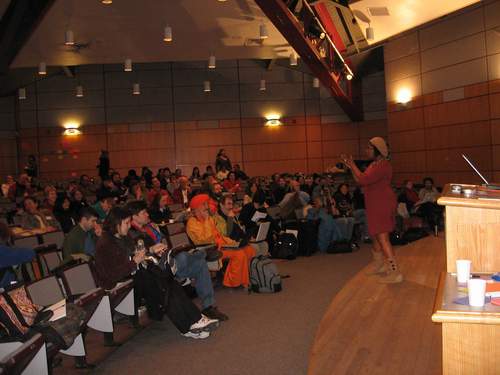
[Elandria Williams from the Highlander Research and Education Center and member of the USSEN Coordinating Committee addresses the first plenary session]
Nearly 400 organizers, activists and educators attended the Forum, coming from North America, South America, Europe and Asia. Arriving in the midst of the world economic crisis, people were eager to share their experiences, to learn from each other and to work together to design alternatives.
The Forum program included plenary sessions on Defining the Solidarity Economy, Real World Visions and Models of the Solidarity Economy, and Building the Solidarity Economy Movement and with 200 workshops addressing topics such as the practical dimensions of forming co-operatives, the history of the solidarity economy in different countries, developing a green economy, cooperative housing, fair trade, credit unions, alternative currencies, cooperatives in Venezuela, worker takeovers in Argentina, feminist economics, the social economy in Quebec, the role of labor unions, solar power and many more.
“A Liberatory, Equitable, and Sustainable Economy”
Participants in the “Liberatory, Equitable, and Sustainable Economy” workshop represented a wide range of economic activities, including a community land trust, a credit union, a responsible endowment, organic agriculture, organizing against gentrification, sustainable community housing, educational organizing, community economic development, and labor education. Several students who took part are studying social thought, social change, and sustainable agriculture.
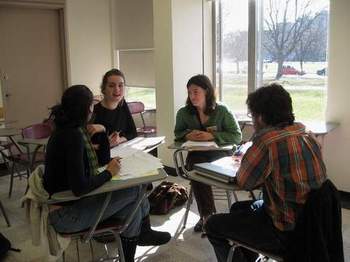
After all the participants introduced themselves, Nina offered an overview of the Charter of Human Responsibilities. She focused on creating cultures of responsibility and the difference between acting out of duty or obligation (based on norms) and acting voluntarily to take responsibility (based on values). We affirmed that responsibility has different meanings in different cultures and communities and also the differential power we have to take responsibility. Collective action as a component of the solidarity economy is an example of how collective responsibility can accomplish more than individuals acting responsibly.
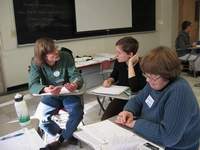 Wolfgang Hoeschele (on the left in the photo) built on Nina’s discussion about responsibility by asking, what shall we take responsibility for? What do we want to achieve?
Wolfgang Hoeschele (on the left in the photo) built on Nina’s discussion about responsibility by asking, what shall we take responsibility for? What do we want to achieve?
He has been working on a vision and agenda for economic change through a critique of how scarcity is generated in the currently dominant economic system, and how we can create abundance instead, while promoting individual freedom, social equity, and environmental sustainability all at the same time (which is often regarded as impossible).
[see sidebar for more on abundance and scarcity]
Workshop participants formed small groups to discuss how they can take responsibility to work toward these goals. An aid to the discussion was a matrix supplied by Nina that identified various roles each of us may play (as wage earner, consumer, saver, supporting others, citizen/voter, or activist) and scales of action (individual, family, community, workplace, state, country, and world).
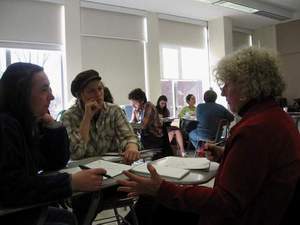 |
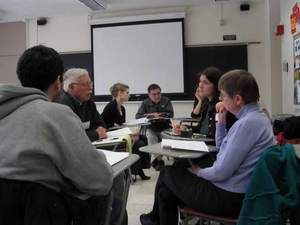 |
After these group discussions, several members of the group shared their observations from the exercise:
• I noticed how connected everything is – from the individual to the world – and the importance an individual has in the world.
• I became more familiar with the language of the solidarity economy.
• This set of values (of the solidarity economy) has existed for a long time. We are now switching to express these values.
• There are lots of things we are already doing to take responsibility for the economy.
• In every decision I am taking the focus off of myself and onto the people around me. I am thinking more globally.
• I am feeling vulnerable – not afraid of being vulnerable because I see how many resources we have.
• My thinking has been transformed about the possibilities that can come from economic disaster.
• I realized how much we have in our community and connecting with it makes us stronger.
• I will be reaching beyond our circle or neighborhood; we need to create linkages.
As US Coordinator of Charter activities, Nina is continuing to work with USSEN and with a group of activists who are preparing a community workshop on the solidarity economy. CHR committees have supported Solidarity Economy networks and conferences in Asia and South America for many years.
| Wolfgang Hoeschele’s work hinges on a critique of economics – claiming that economics as it is studied today is not a science of the allocation of scarce resources, but rather a science of the profitable allocation of scarcity. Resources are profitable only if they are scarce – abundant resources such as air can not be bought and sold because everybody can obtain them freely. However, if a formerly abundant resource is made scarce, there is a potential for profit. Resources are abundant if the demand for them is far less than the supply, or if they are used in ways that are not degrading to the resource. Thus, the way to make a resource scarce is by degrading it, or by manipulating supply or demand of that resource.
The work of making resources scarce is not left to chance but is performed by “scarcity-generating institutions.” Examples include various kinds of property regimes (e.g., private property of land if most of the land is held by a few, and the many can not reap the rewards of the labor they invest in the land), all kinds of oligopolies and monopolies (allowing monopoly companies to manipulate prices), financial institutions that make money scarcer than the goods and services that are to be traded (e.g., interest), the manipulation of demand by advertising, and radical monopolies as conceived by Ivan Illich (e.g., the radical monopoly of transport by private motor-vehicle, making it difficult or impossible to move around by walking, cycling, or public transport). The most basic scarcity-generating institution is the belief that human needs are limitless, and are best served through market institutions based on competition as the predominant form of social interaction. Together, these scarcity-generating institutions undermine individual freedom (limiting people’s choices), social equity, as well as environmental sustainability. How do we overcome these modes of creating scarcity? At the most basic, we have to work at creating abundance by rejecting dualisms that exclude any group of people, and embrace an ideal of wholeness and freedom, where freedom is conceived as the freedom of everybody to live life as art, or as self-expression to others. This involves exploring one’s true needs (which always exist in relationship to others) and seeking ways to express one’s own core values to others. Such freedom must always allow all others the same freedom. To support this vision of freedom, for everybody in the present as well as the future, requires supporting institutions, such as property regimes that allow everybody a fair share of resources (e.g., real common property in air, rather than allowing some people to pollute air at everybody else’s expense), and the promotion of individual and community-level self-reliance and cooperation. Examples of the latter include all kinds of initiatives represented at the solidarity economy conference, including parallel currencies, common good banking, community gardens and community supported agriculture, worker coops, and many others. It is vital to build coalitions among all these groups of people in order to provide better support for all of their activities. The questions to address in taking responsibility under this framework are: In which ways do I, and the institutions to which I belong, contribute to the generation of scarcity or of abundance? How can I, and the institutions to which I belong, generate less scarcity and more abundance? For more information, see http://sociology-anthropology.truma... |
For more information, contact Nina at charter_US dN4 att.net or charter.US dN4 alliance21.org


